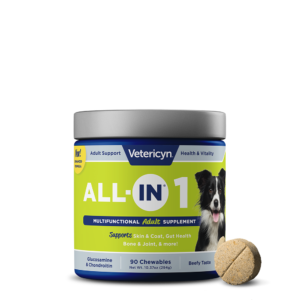Updated 6/24/2025
Rich in omega-3s and heart-healthy benefits, a daily fish oil supplement seems like a no-brainer, especially for those who aren’t fans of seafood. But while your pup is chowing down on that leftover salmon you didn’t enjoy, have you ever considered that they might benefit from those omega-3s as well?
Fish oil is one of the most multi-talented supplements when it comes to a dog’s overall wellness. Not only does it encourage heart and blood health, but it’s also beneficial to your pup’s skin, fur, and joints. It even supports mental health.
Below is everything you need to know about supplementing with fish oil for dogs, and why it just might make you their hero.
What is Fish Oil?
Fish oil is the purified oil and water that’s pressed from cooked fish.1 You may have heard of its health-boosting effects when taken as a supplement for humans, and the same goes for dogs.
Fish Oil’s Fatty Acids
Fish oil’s superpowers lie in the long-chain omega-3s it contains.2 These fatty acids, called eicosapentaenoic acid (EPA) and docosahexaenoic acid (DHA), offer an impressive array of benefits. Primarily, omega-3s partner with the heart and blood to organically promote cardiovascular and eye health while also nurturing your pup’s coat and immune system.2
- EPA can be a boon when it comes to heart health in that it may moderate triglycerides and support appropriate blood pressure levels.10
- DHA provides the remaining advantages of fish oil, like shoring up mental health and supporting cognitive function in young and elderly pups alike.5
That said, there’s even more to omega-3s than meets the eye—some research shows they may also offer neuroprotective advantages and curb a blue mood (which, yes, your dog is susceptible to).15
How Does Fish Oil Work?
Omega-3s work by enhancing cell function, particularly cells’ communication with each other.4 They also help block the bad effects of certain fatty acids in the body – the same ones that anti-inflammatory medicines target. This helps lower inflammation and makes the body feel better.4 By helping your dog consume an adequate amount of omega-3s, you’re letting these important fatty acid molecules build a reservoir of themselves in each cell membrane.
- The omega-3s in fish oil may also prompt healthy immune responses in your pup. While inflammation, which is generated by the immune system, is a natural defense against injury and infection, an uncontrolled inflammatory reaction may become unhealthy and damage tissues over time. Fortunately, omega-3s have the potential to balance out this organic response. Wild Alaskan salmon oil and other oil supplements can moisturize your dog’s dry skin, reduce their risk for heart disease, and make your lives less stressful as pet parents.4
How Can You Increase Your Dog’s Fish Oil Intake?
So how can you include more omega-3s in your pup’s diet?
As long as you’re okay with treating them to a little human food, you can increase your dog’s omega-3s. This is because both EPA and DHA are found in cold-water fish like salmon, as well as mackerel and tuna.5,10 DHA is also found in seaweed and algae.5
It’s also a good idea to include a regular supplement in their diet, such as a dynamite multivitamin that also offers additional perks.
A third fatty acid, alpha-linolenic acid (ALA), is found in plant-based sources like leafy greens and flaxseeds.
Do Dogs Need Fish Oil Supplements?
The short answer is yes—the American Kennel Club confirms that fish oil is one of the best supplements you can add to your furry friend’s diet.3 The American Veterinary Medical Association (AVMA) also notes fish oil’s therapeutic effect for several health problems in dogs, such as skin issues, heart disease, joint pain, high cholesterol, and others.11 Consult your vet for an evaluation of your pup’s current eating habits, as fish oil may be recommended as either a long-term addition or a temporary boost.
Fish oil provides many of the same benefits for a dog’s diet as for humans. It’s heart-friendly, it encourages immune health, and it promotes healthy skin and fur.
Omega-3s are particularly important for dogs because they balance out omega-6 fatty acids. Omega-6s are found in a variety of ingredients typically featured in traditional dog food, such as:
- Most grains
- Processed foods
- Refined oils
- Corn-fed meat
While both humans and dogs need omega-6s and omega-3s, our modern diets often contain omega-6s in excess, which need to be balanced out with an omega-3 supplement.3 Fish oil, flaxseed oil, and krill oil contain omega-3s and help balance and counteract omega-6 excess.
According to the Mayo Clinic, taking fish oil may reduce vitamin E levels, so vitamin E supplementation may be needed.12 This is why the right supplements will include vitamin E alongside omega-3 fatty acids. Be careful to ensure your dog’s supplements are being absorbed, as they can’t work if they’re not absorbed.

Types of Fish Oil for Dogs
When choosing a supplement for your pet, you may encounter a few different types of fish oil. Below is a breakdown of each and which we recommend.
Natural Triglyceride Oil
Natural triglyceride oil is the most natural form of fish oil and is the easiest for dogs’ bodies to absorb.3 However, be wary of contaminants your pup may be allergic to, as this form of fish oil is straight from the source and may not be purified.3
Ethyl Ester Oil
Ethyl ester oil is fish oil that has been concentrated and distilled, meaning it’s less likely to have the impurities that natural triglyceride oil might.3 It’s considered “semi-natural,” and offers the highest concentration of both EPA and DHA fatty acids.3
Synthetic Triglyceride Oil
While still safe and healthy for your pet, synthetic triglyceride oil is the least natural and most difficult to absorb of the three types.3
A Note on Dosage
Some dogs can develop side effects at higher fish oil dosages. Talk to your vet about the best starting dose for your dog, and notify your veterinarian if you notice side effects such as vomiting or diarrhea.6
The fish oil amount varies depending on::
- Your dog’s weight
- The type of fish oil you choose
- Whether you’re attempting to support a specific area of health
Health Benefits of Fish Oil for Dogs
Fish oil is a powerhouse supplement, offering a wide range of benefits for your pet:
Keeps Coat Silky
Fish oil keeps dogs’ fur silky and shiny, while also preventing itchy, flaky skin.13 Omega-3s even promote hair growth, meaning your pup’s coat may become thicker and fuller.
Supports Joint Health
Fish oil may naturally facilitate joint health.9 This can be a game-changer for dogs, who are prone to developing tenderness (and general wear and tear) in their joints as they age. Giving your dog collagen or glucosamine supplements may further support their joint health.
Encourages Wound Healing
These fatty acids may even prevent wounds from becoming infected and reduce scar formation (so you don’t have to worry when your pet’s social roughhousing goes a little too far).7
Other benefits of omega 3 fatty acids in dogs include support for other problems, such as13:
- Kidney insufficiency
- Heart failure
- Lymphoma
- Airborne allergies

How to Store Fish Oil
It’s important to store fish oil in the refrigerator (away from heat, light, and air) and to throw it away if it becomes oxidized, as it can become rancid and unsafe to consume (your first clue will be an “off” smell).3
If you buy a bottle of fish oil, choose a dark one that won’t let much light in.3
Go ALL-IN With Fish Oil
Feeding your pet a 100% natural, whole-foods diet that promotes gut health is nearly impossible. After all, human food is often the same (or worse) as kibble on the “healthy” scale for your pet (and far more difficult to research and prepare).8
Fortunately, an all-natural supplement is a proven way to balance out your pup’s nutritional profile—and Vetericyn’s ALL-IN dog supplement is an excellent choice. This supplement contains fish oil, as well as several other crucial vitamins and nutrients, including vitamin E.
Available for puppies, adult dogs, and seniors, ALL-IN is the perfect way to keep your pup healthy in their days of youthful frolicking outside and cognitively sharp as they age.
Next time you take your daily multivitamin, consider investing in Vetericyn for your best friend. It might sometimes smell fishy, but the science behind fish oil for dogs shows its fin-tastic benefits.
 Reviewed by Dr. Kathy Adamson
Reviewed by Dr. Kathy Adamson
Dr. Kathy Adamson earned her bachelor’s degree from the University of Notre Dame and her Doctor of Veterinary Medicine degree from the University of Wisconsin-Madison School of Veterinary Medicine.
She completed a one-year small animal medicine and surgery internship at the North Carolina State College of Veterinary Medicine. Alongside her studies, Kathy worked in a research lab, contributing as an author and co-author to various journal articles.
She has also pursued medical writing and editing certification through the University of Chicago Graham School. Currently, she runs KMA Veterinary & Medical Writing, a freelance medical writing company, serves as the Digital Content Manager for the Greater Chicago Area Chapter of the American Medical Writers Association, is a member of the AMWA Communications Committee, and enjoys writing about healthcare topics for people and their cherished pets.
![]() https://www.linkedin.com/in/kathyadamsondvm/
https://www.linkedin.com/in/kathyadamsondvm/
Sources:
- Britannica. Fish oil. https://www.britannica.com/science/fish-oil
- NIH. Omega-3 supplements: in-depth. https://www.nccih.nih.gov/health/omega3-supplements-in-depth
- American Kennel Club. Fish oil for dogs. https://www.akc.org/expert-advice/nutrition/fish-oil-for-dogs/
- National Library of Medicine. The science behind dietary omega-3 fatty acids. https://www.ncbi.nlm.nih.gov/pmc/articles/PMC2174995/
- Mount Sinai. Docosahexaenoic acid (DHA). https://www.mountsinai.org/health-library/supplement/docosahexaenoic-acid-dha
- Colorado State University. Canine fish oil dosing chart. https://vetmedbiosci.colostate.edu/vth/services/orthopedic-medicine/fish-oil-dosing/
- National Library of Medicine. Role of arginine and omega-3 fatty acids in wound healing and infection. https://www.ncbi.nlm.nih.gov/pmc/articles/PMC4217020/
- Tufts University. Human grade: should pets eat the same food that we do? https://sites.tufts.edu/petfoodology/2019/02/15/human-grade/
- Cornell University. How joint supplements can help with orthopedic conditions. https://www.vet.cornell.edu/departments-centers-and-institutes/riney-canine-health-center/canine-health-information/how-joint-supplements-can-help-orthopedic-conditions
- Mount Sinai. Eicosapentaenoic acid (EPA). https://www.mountsinai.org/health-library/supplement/eicosapentaenoic-acid-epa
- Bauer JE. The essential nature of dietary omega-3 fatty acids in dogs. J Am Vet Med Assoc. 2016 Dec 1;249(11):1267-1272.
- Fish oil. Mayo Clinic. Accessed May 14, 2025. https://www.mayoclinic.org/drugs-supplements-fish-oil/art-20364810
- Omega three fatty acids for our pets. Veterinary Partner – VIN. Accessed May 14, 2025. https://veterinarypartner.vin.com/default.aspx?pid=19239&id=9155186
- Mayo Clinic. Fish oil. https://www.mayoclinic.org/drugs-supplements-fish-oil/art-20364810
- Vancouver Sun. Pet Therapy | Omega 3 may help calm anxious pets. https://vancouversun.com/health/family-child/pet-therapy-omega-3-may-help-calm-anxious-pets
